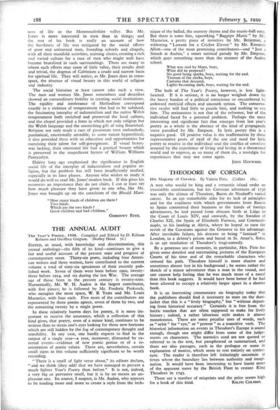THEODORE OF CORSICA
His Majesty of Corsica. By Valerie Pirie. (Collins 18s.)
A MAN who would be king and a romantic island make an irresistible combination, but his Corsican adventure of 1736
was only the climax of Theodore, Baron de Neuhoff's varied career. In an age remarkable alike for its lack of principles and for the readiness with which governments from Russia to Spain committed their business to the hands of foreign adventurers, he had passed from obscure birth at Liege to the Court of Louis XIV, and onwards, by the Sweden of Charles XII, the Spain of Elizabeth Farnese, and Constanti- nople, to his landing at Aleria, where he hoped to turn the revolt of the Corsicans against the Genoese to his advantage.
After inevitable failure, his descent to being " lionised " in London, to a debtor's prison and burial in St. Anne's, Soho, is an apt resolution of Theodore's tragi-comedy.
By a generous use of memoirs, in particular, Mrs. Pirie has given some detailed and entertaining pictures of the European Courts of his time and of the remarkable characters who crossed his path. Theodore himself is more elusive and sometimes almost lost in his background ; he seems rather the sketch of a minor adventurer than a man in the round, and one cannot help feeling that he was much more of a rascal than this book suggests. It would have been better if he had been allowed to occupy a relatively larger space in a shorter book.
It is an interesting commentary on biography today that the publishers should find it necessary to state on the dust-
jacket that this is a " lively biography," but " without depart- ing from historical accuracy." Certainly it is free from the hectic touches that are often supposed to make for lively history ; indeed, a rather laborious style makes it almost monotonous. There are some peculiar uses of words, such as " orbit " for " eye," or " pretext " as a transitive verb. The historical information on events in Theodore's Europe is sound enough, though one might differ from some of the judge- ments on characters. The memoirs used are not quoted or referred to in the text, but paraphrased or summarised, and there are also passages, such as the prologue or some in explanation of motive, which seem to rest entirely on conjec-
ture. The reader is therefore left irritatingly uncertain at times where the boundary lies between authority and imagi- nation. It would have been interesting to have learnt more of the apparent move by the British Fleet to restore King Theodore in 1743.
There are a number of misprints and the price seems high










































 Previous page
Previous page